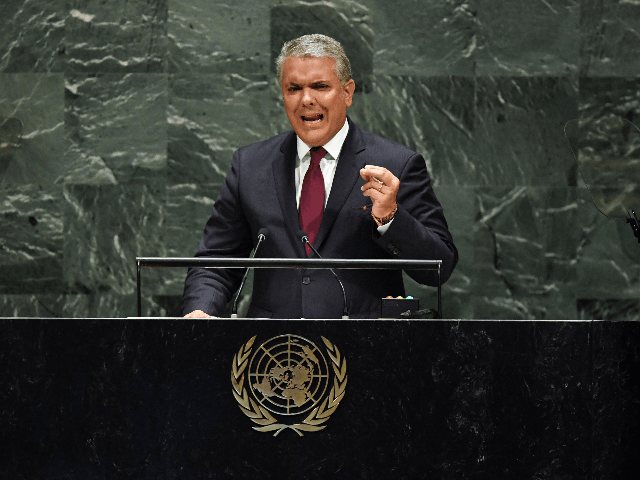The government of Colombia announced Monday that it would offer temporary protected status for ten years to Venezuelan refugees who entered the country illegally, essentially offering a pathway to legal residency for nearly a million people.
Colombian officials estimate that 1.7 million of the about 6 million Venezuelans who fled the socialist dictatorship are in Colombia, most of them illegally. Venezuela and Colombia share a long, often poorly secured border, and the regime of dictator Nicolás Maduro has deliberately complicated the process for Venezuelans to obtain passports and other legal documents necessary to leave the country, exacerbating the worst migrant crisis in the history of the Americas.
At the height of the Venezuelan political crisis in 2018, former Colombian Foreign Minister Carlos Holmes Trujillo, who died this year after testing positive for the Chinese coronavirus, warned that, in a worst-case scenario, Colombia should expect a wave of as many as 4 million Venezuelan refugees.
Colombia’s gesture to the Venezuelans follows 20 years of socialism in the latter nation but, prior to its collapse under leftist policies, Venezuela was the top destination for Colombian refugees. Colombia has endured over half a century of Marxist terrorism, largely at the hands of the Revolutionary Armed Forces of Colombia (FARC) and the National Liberation Army (ELN). The result has been a situation in which Colombia has the largest internally displaced population in the world and the largest refugee population in the world except for one other nation, Turkey.
Many of those Venezuelans fleeing to Colombia had either previously fled Colombia for Venezuela or are descendants of Colombian refugees.
“We are making public the decision of our country to create a temporary protected status in Colombia that will allow us to create a process of regularization of these migrants who are in our country,” conservative President Iván Duque said Monday, referring to the Venezuelans. The temporary protected status allows Venezuelans who have no documentation to their name to begin the process of applying for a residential visa in Colombia, effectively opening a path for them to remain legally in the country, at least for ten years.
These migrants, Duque said, will receive “a path to regularization that implies a clear, accurate registry of places of residence and their socioeconomic conditions.” Legalization will allow Venezuelans to access Colombian social programs, as well.
“The mechanism, according to analysts, is key for the country, as it implies that citizens arriving from Venezuela will have greater access to basic services, like health and education,” Colombia’s El Tiempo newspaper explained, “and it will facilitate their entry into the formal employment market, which could help the country economically at a time in which public finances have been hurt by the [Chinese coronavirus] pandemic.”
The legalization may provide an answer to one of the more complex problems facing Colombia in its fight against the Chinese coronavirus: how to use vaccinations to approach herd immunity when upwards of a million people in the country are unaccounted for. Duque insisted in an interview in December that illegal Venezuelans would not have access to a subsidized coronavirus vaccine, stating the move was necessary to avoid a “stampede” of Venezuelans seeking vaccines in the country. Dictator Maduro has yet to begin any vaccine distribution, instead promoting fraudulent coronavirus cures like his religious “miracle droplets” or “rectal ozone therapy,” which scientists warn may be deadly.
The new immigration status will not allow the Venezuelans to vote in Colombian elections.
In his remarks, Duque thanked the Venezuelan people for their history of welcoming Colombian refugees and cited it as a reason for the forgiving policy.
“Let this be an opportunity to show that, just as throughout many decades many Colombians who crossed into Venezuela seeking fraternity and opportunity received it, so too we have created this temporary protected status,” Duque said.
#AHORA Duque: Son más de 6 millones de hermanos venezolanos que han salido de su país huyendo de la dictadura y la pobreza. Vimos que el salario en ese país no llega ni a 10 $, lo que significa que la pobreza es de 90 % https://t.co/7Nuok9JECk pic.twitter.com/RpMZzoQweK
— NTN24 Venezuela (@NTN24ve) February 8, 2021
The history of Colombian migration into Venezuela escalated significantly in the 1960s and ’70s, when the FARC and other communist groups escalated their attacks on rural communities. The FARC largely subsidized itself — and continues to do so, though much of its leadership has taken a political route out of imprisonment offered by a 2016 peace deal — through mass abductions of children and drug trafficking. Of those abducted, many were and are young girls, at least hundreds of whom the Colombian government believes are subject to systematic rape and, subsequently, forced abortions.
No exact figure on the number of Colombians who fled to Venezuela during the height of the FARC war exists, but experts believe it to be in the millions of people. Prior to the rise of Hugo Chávez in 1999, Venezuela was the wealthiest country in Latin America, largely due to its extensive oil wealth. The widespread nationalization of successful industries, persecution of political dissidents, and the imposition of irrational price controls on necessary goods have descended the country into hyperinflation and rendered its currency, the bolívar, worthless.
Venezuela is now believed to be hiding several senior FARC officials who abandoned the peace deal and returned to narco-terrorist activities, posing a critical national security threat to its neighbor.

COMMENTS
Please let us know if you're having issues with commenting.